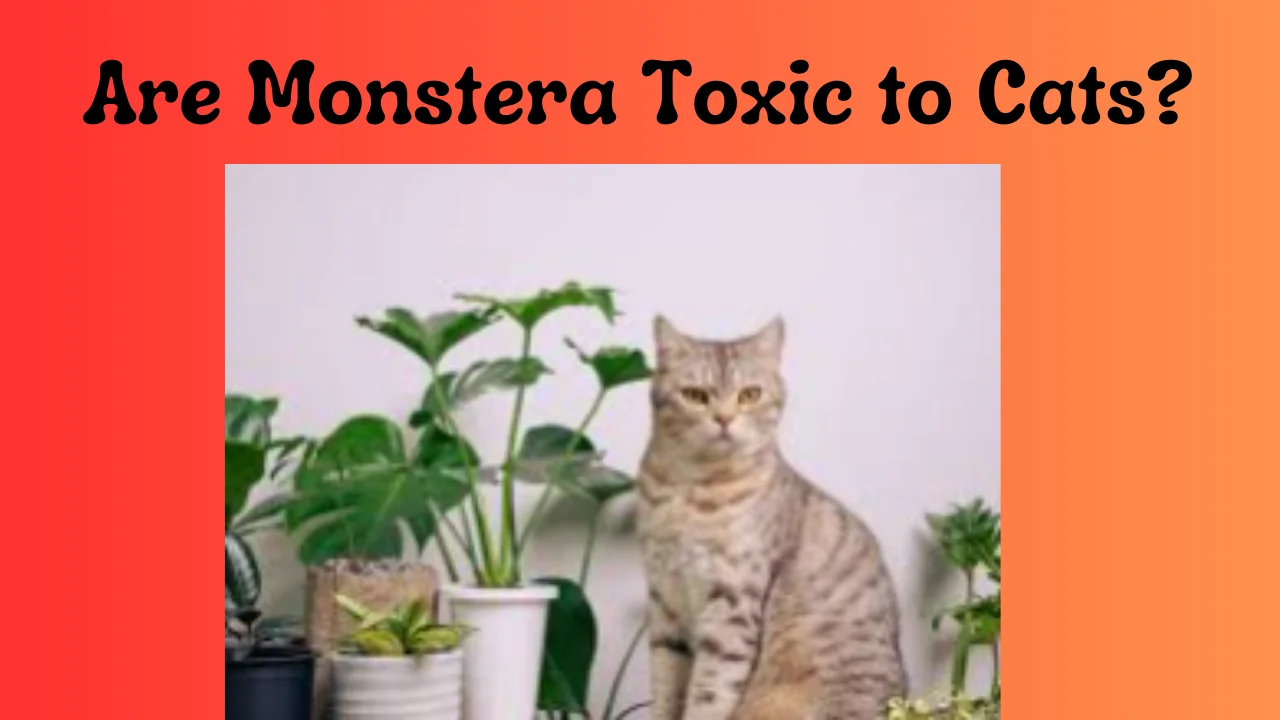Monstera plants, with their striking and distinctive leaf patterns, have recently exploded in popularity among those who enjoy growing plants indoors. But many wonder if these plants are safe to keep in homes with other pets, especially cats. Are Monstera toxic to cats? Looking at the potential toxic effects of Monstera plants and offering practical advice for cat owners, this article investigates whether these plants are safe for cats to eat. Our goal is to provide trustworthy information for cat owners by combining expert insights with a focus on factual accuracy.
Understanding Monstera Plants
The Araceae family counts Monstera plants among its members; the plant is also known as Swiss cheese plant because of the noticeable holes in its leaves. The lush foliage and frequently dramatic appearance of these plants, which are native to tropical forests of Central and South America, make them beloved by many households.
Growth and Care Requirements
Monstera plants require little attention and flourish in partial shade and moderate watering. Because of their climbing habit, they require a moss pole or other structural support; additionally, they can reach impressive sizes, making them eye-catching houseplants.
Monstera plants have become an essential part of modern home design due to their eye-catching appearance. They have become a trend in interior design publications and on social media due to their enormous, fenestrated leaves, which bring a little bit of the tropics indoors.
Varieties of Monstera
Monstera deliciosa is the most well-known species of Monstera, but there are other species as well. One of these, Monstera adansonii, has smaller and more perforated leaves. Although they may look very different, each variety has very similar maintenance requirements.
Why They Attract Cats
Monstera plants are popular with cats because of the tactile experience and dangling leaves they provide. Because of this, the possibility of toxicity arises when cats chew on the leaves.
Toxicity of Monstera Plants to Cats
Monstera plants are poisonous to cats, that much is true. Insoluble calcium oxalates are the main toxicant in these plants and can inflict severe pain and health problems in cats if they consume them.
Symptoms of Monstera Poisoning in Cats
Oral irritation, excessive drooling, vomiting, and difficulty swallowing are some of the symptoms that cats may experience when they chew on or consume Monstera leaves. These signs and symptoms are brought on by the mechanical harm that the needle-like oxalate crystals inflict.
Immediate Actions to Take
You must act immediately if you think your feline friend has ingested a Monstera plant. After you’ve cleaned your cat’s mouth of any plant matter, give it some water to drink. For immediate expert advice, it is advised to contact a veterinarian.
Long-Term Health Concerns
Monstera ingestion can cause frightening symptoms, but if treated quickly, they typically do not pose any long-term health risks. But if you don’t want these problems to come up again, you have to stop people from getting to the plant.
Treatment Options
In order to aid the cat’s recovery from the toxic exposure, a veterinarian may prescribe anti-inflammatory drugs, pain medication, and supportive care like intravenous fluids. How serious the symptoms are and the cat’s general health will determine the exact course of treatment.
Preventing Monstera Toxicity in Cats
Safe Placement of Plants
Keeping Monstera plants out of cats’ reach is a simple but effective way to avoid poisoning them. Cat owners know better than anyone how curious felines can get into even the most inaccessible of spaces, whether it’s a closed room or a high shelf.
Alternative Plants Safe for Cats
If you’re looking for a safer alternative that won’t harm cats, there are a few that can coexist with them. Cats can safely enjoy spider plants, Boston ferns, and bamboo as houseplants.
Training Cats to Avoid Plants
Another useful skill to teach cats is to avoid getting them to touch houseplants. Deterrents like citrus sprays or creating a distinct play area with plants that cats can safely explore can assist in refocusing their attention.
Regular Monitoring and Education
It is essential for pet owners to be knowledgeable about plant toxicity and to keep a close eye on their pets and plants. Beautiful but potentially toxic plants, like Monsteras, can coexist peacefully with cats in a home with vigilant management and education about the dangers of keeping these plants.
Alternatives to Monstera Plants for Cat Owners
Non-Toxic Houseplants for Cat-Friendly Homes
If you own a cat and are worried about its exposure to Monstera plants, there are plenty of non-toxic options that will still add beauty to your home. Spider plants, Boston ferns, and areca palms are a few common non-toxic options. Not only are these plants perfectly fine for cats, but they also help keep indoor air cleaner, which is great for their health.
Decoratively Ensuring That Plants Remain Out of Reach
In addition to picking out non-toxic plants, a good tactic is to use ornamental pieces like wall-mounted planters or hanging baskets to physically separate plants from cats. By taking this precaution, pet owners can admire their beloved plants without worrying that their furry friends will nibble on them.
Plant Cages or Protective Barriers
Another option for keeping pets away from plants is to use plant cages or protective screens. These barriers are designed to keep pets away from plants while still preserving their aesthetic value. For bigger plants that aren’t portable or easy to hang, they can be a lifesaver.
How to Keep Cats Away from Monstera Plants
Training Techniques to Discourage Interest
Consistency and patience are key when training cats to stay away from Monstera plants. You can train them over time by using either negative reinforcement, like making a loud noise when they get too close to the plant, or positive reinforcement, like rewarding them when they get too far away.
Natural Deterrents and Repellents
Put some cat-safe natural deterrents around the plants, such as vinegar, citrus peels, or essential oils. Most cats will avoid areas where these smells are present because they dislike them.
Creating a Distraction with Cat-Friendly Zones
Instead of letting your feline friend destroy your plants, create spaces in your house where they can run around and play. They can occupy themselves with interactive toys, scratching posts, and cat trees.
Signs Your Cat Has Chewed on a Toxic Plant
Visible Chewing on Plant Leaves
Damage to the leaves is the most obvious indication that a cat has gnawed on a plant. Cats are known to chew on Monstera plants, so if you find bite marks or missing pieces, it’s probably your cat.
Physical Symptoms Exhibited by Your Cat
Drooling, pawing at the mouth, and vomiting are some of the symptoms that cats may show after chewing on a poisonous plant. These symptoms can be caused by the toxins in the plant and can indicate oral irritation or gastrointestinal distress.
Changes in Behavior or Appetite
A cat’s behavior may change, like becoming more lethargic or having less of an appetite, if it has consumed poisonous plant material. The cat may be showing signs of pain or discomfort due to the ingestion.
Frequently Asked Questions
Q1: Can Monstera kill cats?
While Monstera is toxic to cats, it is unlikely to be fatal if treated promptly. The primary concern is the discomfort and potential health issues caused by the toxin.
Q2: How quickly do symptoms appear in cats after eating Monstera?
Symptoms can appear within a few minutes to several hours after ingestion, depending on the amount consumed and the sensitivity of the individual cat.
Q3: What part of the Monstera plant is most toxic to cats?
All parts of the Monstera plant contain insoluble calcium oxalates, which are toxic to cats, but the leaves often pose the most risk due to their accessibility and size.
Q4: Are all types of Monstera plants toxic to cats?
Yes, all species of Monstera are considered toxic to cats because they all contain the same type of irritant, insoluble calcium oxalates.
Q5: What should I do if my cat has chewed on a Monstera leaf?
Remove any plant material from your cat’s mouth, rinse their mouth gently with water, and consult a veterinarian immediately for further advice and treatment.
Conclusion
Enjoying the beauty of Monstera plants while ensuring the safety of your furry friends is possible with an understanding of the risks and responsible management strategies. The balance between interior design and pet health can be effectively preserved through the use of preventative measures and the selection of safer alternatives. Are Monstera toxic to cats? It’s essential to research plant toxicity and consider your pet’s behavior before introducing any new greenery into your home.

Melody Roth, a seasoned blog writer with a passion for the delectable world of food, specializes in crafting mouth-watering articles on favorites like pizza and burgers. With years of experience under her belt, Melody serves up stories as tantalizing as the dishes she describes, making her an invaluable voice in the culinary blogging realm.

